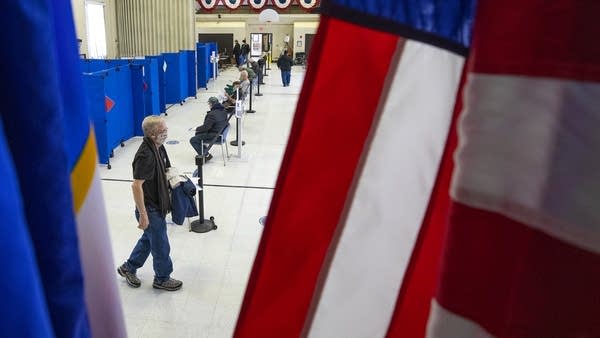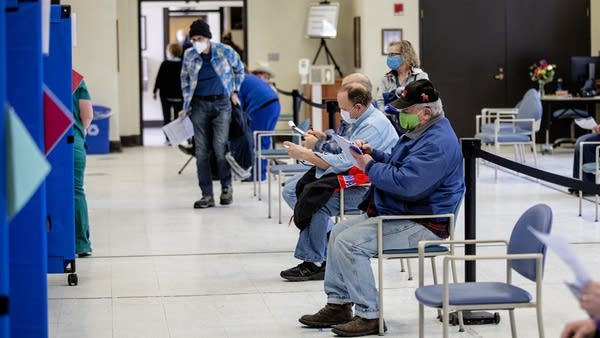Isolated and at risk, veterans hope COVID vaccine brings return to normalcy

Go Deeper.
Create an account or log in to save stories.
Like this?
Thanks for liking this story! We have added it to a list of your favorite stories.
Bruce and Marilyn Springborg have been pretty careful during the COVID-19 pandemic. They've mostly stayed home, and avoided gathering with family for the holidays.
The hardest part: They gave up visiting their grandkids in person.
"We used to stop by and roll the window down, and talk to them and wave,” said Bruce Springborg.
Springborg, 72, is a U.S. Navy veteran. He served two tours in Vietnam, where he was exposed to Agent Orange. He has Crohn’s disease, an autoimmune disorder that makes him more vulnerable to getting seriously ill from the coronavirus.
Turn Up Your Support
MPR News helps you turn down the noise and build shared understanding. Turn up your support for this public resource and keep trusted journalism accessible to all.
Last Wednesday, the Monticello couple sat in a spacious auditorium on the St. Cloud Veterans Affairs campus, after Springborg had received his first dose of the COVID-19 vaccine.
"I’m really hoping that with more people getting vaccinated, the better it's going to be,” he said.
About half of U.S. veterans are over the age of 65, and many have underlying health complications, making them especially vulnerable to the coronavirus. For some, including Springborg, those complications are a direct result of their military service.

So after months of planning, officials at the St. Cloud VA Health Care System say they're working to roll out the COVID-19 vaccine to veterans in its 27-county region as efficiently as possible.
Vaccinations on the St. Cloud campus began in late December with residents and staff in the VA's community living center. It provides long-term care for the most medically fragile veterans in the region.
The VA managed to keep COVID-19 out of the center for months by adopting visitor restrictions and other safety measures — until October, when the virus struck the facility, and about a dozen residents died.
Still, Brent Thelen, director of the St. Cloud VA, praised the staff’s efforts to keep most veterans in the living center safe, despite the odds.
“I think that because of the prevalence of the disease in the community, it was just inevitable,” he said.
About a month ago, staff started vaccinating outpatient veterans who are 85 years or older, then moved to those 75 and older. Now, they're shifting to the next priority group, those between the ages of 65 and 74. It's by far the region’s largest group of veterans, totaling about 15,000, said J.D. Anderson, chief of pharmacy at the St. Cloud VA, who is overseeing the vaccine rollout.

They're also scheduling vaccines for veterans who are essential workers in fields like food, manufacturing and public transit, as well as veterans younger than 65 who have serious health issues.
Anderson said once the VA’s staff finds out how much of the vaccine they'll be receiving that week, they contact veterans in those risk categories and invite them to schedule an appointment.
"We've been able to tweak the numbers of vaccines that we offer each week, so we use our entire supply in that week,” he said. “So if it shows up in my cooler on a Wednesday, all that stuff should be gone the following Wednesday."
So far, Anderson said, most veterans have been eager to get the vaccine, even during the recent cold weather.
"They show up on those coldest days as a badge of honor,” he said.
Still, a number of veterans have declined. Anderson says he thinks the hesitation will fade over time, as more people are vaccinated.
Walter Ridlon, 76, of Little Falls was among the group getting vaccinated last week. Ridlon served in the U.S. Air Force during the Vietnam War era. He said he's been staying home to avoid the coronavirus.

"Actually, since the closedown last spring,” he said, “I've been in Walmart twice. That’s it.”
The St. Cloud VA also is administering vaccines at its community clinics in Brainerd, Alexandria and Montevideo. It’s also using outreach workers to offer the vaccine to veterans living in homelessness.
And it's not just the virus itself that health officials are worried about. Experts have warned that isolation and anxiety related to the pandemic can strain veterans' mental health, as well.
In April 2020, the Bob Woodruff Foundation released a report warning that COVID-19 could present the “perfect storm” for military veterans, with social isolation and unplanned job or wage losses exacerbating existing mental health conditions.
Robert Koetter of Swanville, a 76-year-old Vietnam War veteran and retired grocery store owner, was at the St. Cloud VA to receive a vaccine last week. He said he's missed social interaction in the past year.

"There's no card-playing, no coffee or shaking dice at the cafe,” Koetter said. “It has all been shut down."
VA officials say they're conscious of the strain the pandemic has brought on. They've expanded the use of telemedicine, so veterans can still meet with their doctors and psychologists by phone or video.
Still, not all veterans are comfortable with the technology. And many enjoy going to the VA for the camaraderie, including seeing other veterans and having doctors and nurses who know their names.
VA officials say they hope to be able to increase in-person visits after more people are vaccinated. Thelen said virtual visits are likely to remain even after the pandemic, especially for veterans in rural areas.
"We know that that social element is critically important,” he said.
“But we also know that we have to do it safely."
David Thielen made the half-hour trek from Eden Valley to St. Cloud to get a vaccine. Thielen, 71, typically visits the St. Cloud VA for doctor appointments to manage his diabetes. These days, he talks to a nurse by phone and sends his blood sugar information instead.

Thielen said the pandemic has curtailed other routines, too.
"My wife and I always did a lot of shopping, and we quit that,” he said. “And going out to eat was a big thing. We'd come to St. Cloud, we always go out to eat someplace. That was out of the question."
Thielen knows about sacrifice. In Vietnam, he served in the U.S. Navy's construction battalion, nicknamed the Seabees. They built roads through the demilitarized zone during the Tet Offensive, often while under fire.
Thielen said he thinks everyone should sacrifice during the pandemic, so it bothers him to see people not wearing masks to help stop the virus’ spread.
“If you can't work together at all and help one another, you don't have much of a world,” he said. "I think that's probably one thing you learn in the service is you’d better work together … That's what kind of pulls everybody through."
COVID-19 in Minnesota
Data in these graphs are based on the Minnesota Department of Health's cumulative totals released at 11 a.m. daily. You can find more detailed statistics on COVID-19 at the Health Department website.
The coronavirus is transmitted through respiratory droplets, coughs and sneezes, similar to the way the flu can spread.


